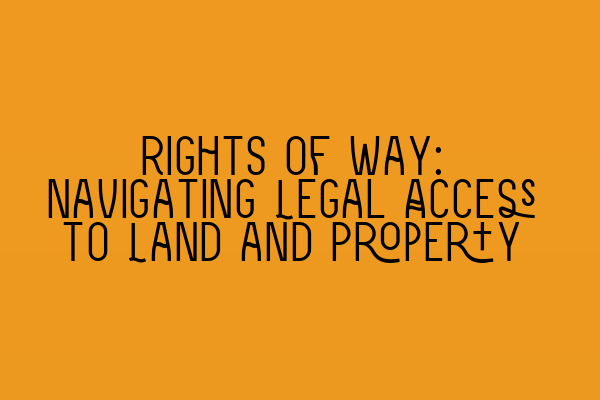Rights of Way: Navigating Legal Access to Land and Property
At SQE Property Law & Land Law, we understand the importance of having clear and legally recognized access to land and property. Whether you are a property owner, seller, or developer, understanding your rights of way is crucial to ensuring a smooth and effective use of your land.
What are Rights of Way?
Rights of way refer to the legal permissions granted to individuals or entities to access or pass through a piece of land that they do not own. These rights can be granted in various forms and for different purposes, such as pedestrian access, vehicular access, or even access to utilities.
Types of Rights of Way
1. Public Rights of Way: These are paths or routes that are open for public use, typically for walking, cycling, or horse riding. Public rights of way can include footpaths, bridleways, and byways.
2. Private Rights of Way: These rights are typically granted to specific individuals or groups of people, giving them the legal right to access a particular piece of land. Private rights of way can be created through a variety of means, including express grant, reservation, or prescription.
3. Easements: An easement is a right to use someone else’s property for a specific purpose. Easements can be created by express grant, implication, or prescription, and can include rights such as access to utilities (e.g., water, electricity) and rights to maintain or repair structures.
How to Establish and Maintain Rights of Way?
Establishing and maintaining rights of way can be a complex process that requires a thorough understanding of property law. Here are some key steps to consider:
1. Determine the nature of the right: Before proceeding, it is essential to identify the type of right of way you require or currently possess. This will help establish the legal framework within which your rights are governed.
2. Review property titles and deeds: Carefully examine the property titles and deeds to ascertain whether any rights of way are expressly granted or reserved. Additionally, consult with a solicitor to investigate any potential implied or prescriptive rights that may exist.
3. Consult with neighboring landowners: If you believe that you require a new right of way or need to clarify an existing one, it is advisable to engage in open and constructive discussions with neighboring landowners. This can help foster positive relationships and potentially lead to the establishment of formal agreements.
4. Seek legal advice: Engaging the services of a solicitor with expertise in property law is crucial to navigating the complexities of rights of way. A solicitor can provide guidance on the legal process, draft necessary agreements or easements, and ensure that your rights are protected.
5. Regular maintenance and compliance: Once a right of way has been established, it is essential to maintain it properly and comply with any obligations laid out in the agreement. This includes keeping the access route clear and accessible, ensuring any necessary repairs are carried out promptly, and respecting any limitations or restrictions imposed by the agreement.
Importance of Rights of Way
Rights of way play a vital role in facilitating the use and development of land and property. They provide necessary access for individuals, such as property owners, tenants, and their guests, as well as essential utility services. Additionally, rights of way contribute to public enjoyment by allowing recreational access to open spaces, footpaths, and other designated areas.
Ensuring Secure and Legally Recognized Access
At SQE Property Law & Land Law, we understand the significance of secure and legally recognized access to land and property. Our team of experienced solicitors can assist you in navigating the complexities of rights of way, ensuring that your access rights are properly established, maintained, and protected.
If you require legal advice or assistance with rights of way or any other property law matters, please contact SQE Property Law & Land Law today. Our dedicated team is here to help you achieve your property goals.
Related Articles:
– SQE 1 Practice Exam Questions
– SQE 1 Practice Mocks FLK1 FLK2
– SQE 2 Preparation Courses
– SQE 1 Preparation Courses
– SRA SQE Exam Dates
